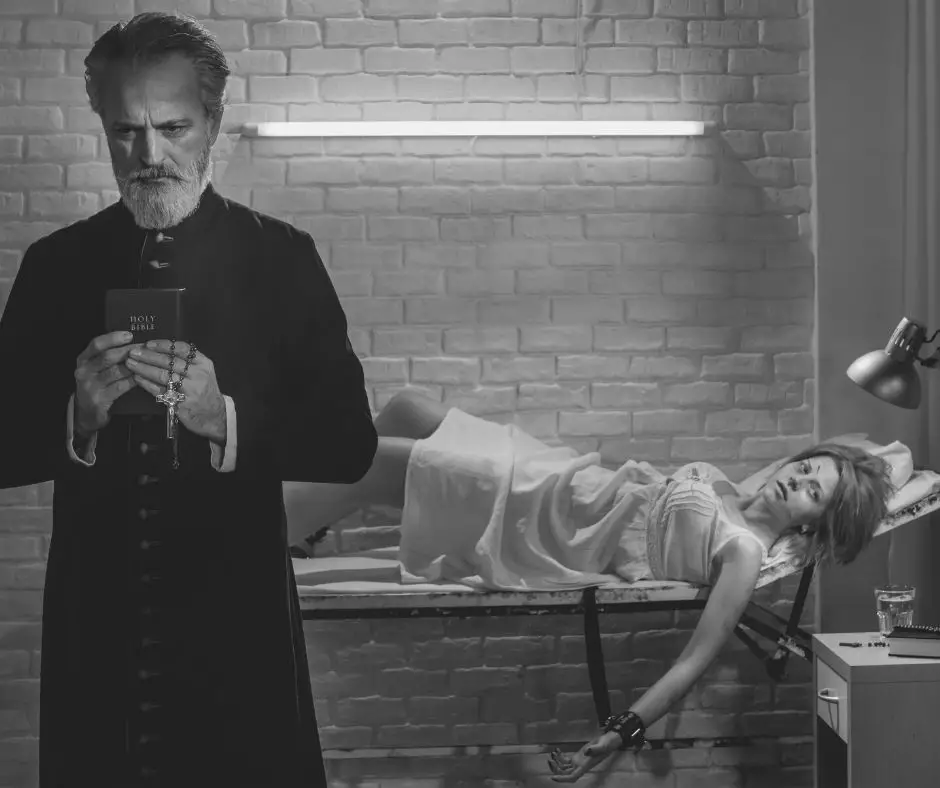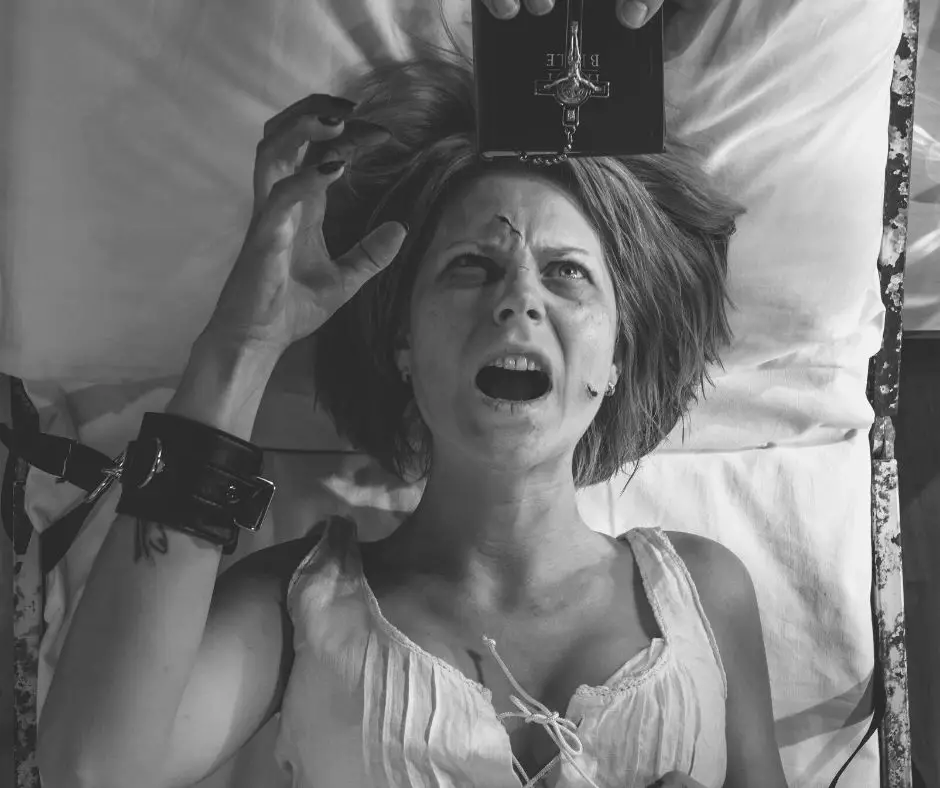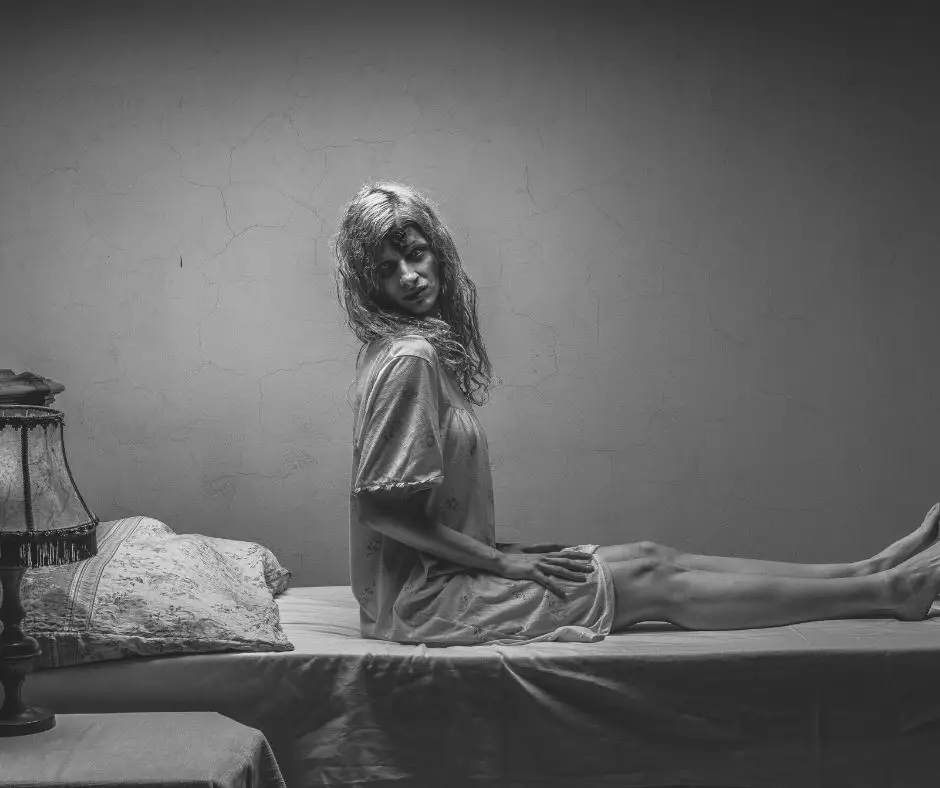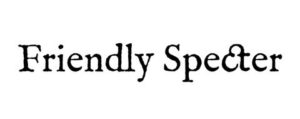Perhaps you’ve heard friends or family members talk about demons and wondered if demonic possession is real. It sounds scary, and movies and books have covered the subject enough to add new freshness to the hysteria. Maybe you have even read a book or watched a film on an exorcism. Is demonic possession real?
Science says that demonic possession isn’t real and is more than likely the result of mental illness. However, you do have cases that even science struggles to explain. Across cultures and religions, demonic possession has existed in some form.
If you’d like to learn more about demonic possession and the argument for and against it, keep reading. I will cover this topic in greater detail. Whether demonic possession exists or not widely depends on who you ask.
Mental Health and Demonic Possession
No one honest with themselves can say with absolute certainty that demons exist or don’t exist because we don’t have enough evidence. Science likes concrete proof to back everything up. Because of that, you won’t find demonic possession as recognized in the Diagnostic and Statistical Manual of Mental Disorders.
as recognized in the Diagnostic and Statistical Manual of Mental Disorders.
Psychiatrists and clinicians widely use this handbook to diagnose and classify mental illness. Even in cases where a patient believes themselves demon-possessed, professionals will rarely give it as an actual diagnosis for good reasons. It may exist, but we have a sad history related to mental illness and demonic possession. Throughout much of history, the mentally ill had to suffer through severe trauma, even risking death to be cured.
In the past, patients who had the following disorders often undertook an exorcism to cure themselves:
- Schizophrenia
- Delusions
- Personality issues
- Severe depression
- Hallucinations
Each of the mental health disorders listed above can cause frightful behavior in some situations that may seem like demonic possession. To give an example, some schizophrenics believe that they can hear the voice of Satan and murder their whole family as a result. They say that they were demonically possessed during the killings. For a good reason, we don’t accept that excuse in the justice system.
I highlight this point because an exorcism, while it does have its positive points for those who need it, is no replacement for mental health treatment. You should consider the exorcist carefully because, in some cases, an exorcism becomes a severe form of abuse. Only use reputable exorcists. In a few cases, people died going to the wrong one.
Important: Never label anything paranormal before all natural causes are ruled out. Please consult a professional health provider if you are struggling with health or mental issues or think a demon possesses you. Find international suicide prevention helplines here .
.
Are There Cases of Actual Demonic Possession?
Hollywood has blown this up to unrealistic proportions because demonic possession in real life will rarely look as exaggerated. Some argue that there are no paranormal phenomena present at exorcisms . However, I can think of a couple of cases where people can’t necessarily explain it.
. However, I can think of a couple of cases where people can’t necessarily explain it.
One example of those cases was the case of Anneliese Michel. She died after 67 exorcisms nine months due to malnutrition, but it’s an interesting case to learn about for those who want one of the more infamous cases that have the potential of being real. Ultimately, her parents and the priest were convicted of negligent homicide.
Getting material evidence on demon possession is next to impossible right now with the technology we have. We can’t, for example, use anything concrete to collect real evidence. Video evidence is easy to fake, which makes it difficult to use. In some cases, even the person believed to be possessed could be influenced by their biases and preconceptions.
In another example of an unexplainable demonic possession, we pull from the movie “The Rite.” In this movie, a 200-pound Lutheran Deacon was thrown across the room by a 90-pound woman. This is based on an actual event that happened and goes beyond the explainable. One of the characteristic signs of demonic possession is inhuman strength.
Fictional Exorcisms vs. Real Exorcisms
Hollywood never stops in its movies about exorcisms to capitalize on the fascination with it. Beware of anything that says, “Based on a true story.” That statement doesn’t mean that everything about the movie will be real. It means that the events remain true to the real story, but Hollywood has slightly exaggerated or fictionalized them.
Especially beware of any time that you hear, “Inspired by a true story.” This means that the exorcism was almost entirely made up, but they took inspiration from actual events. Whenever you watch a movie on an exorcism, take it with a grain of salt.

Real exorcisms usually happen to people who are mentally disturbed. Whether real or not depends on who you ask, but we don’t have evidence either way. Before a real exorcism takes place, an independent psychiatric and psychological report must be given.
The movies don’t do that. Every reputable exorcist requests this first to understand the patient and their condition.
The most common reasons for demonic possession, according to exorcists from the Catholic church, is:
- Occult involvement
- Trauma
- Victims of curses
- Morally corrupt lifestyle
- Unforgiveness
- Pornography
Michael Cuneo, author of American Exorcism , says that after attending over 50 exorcisms, he never saw a single supernatural phenomenon (affiliate link – Amazon). They did not show the same things that you would see in Hollywood, such as spinning heads, levitation, or demonic scratches on the person’s face.
, says that after attending over 50 exorcisms, he never saw a single supernatural phenomenon (affiliate link – Amazon). They did not show the same things that you would see in Hollywood, such as spinning heads, levitation, or demonic scratches on the person’s face.
The eye color might have changed, but it wouldn’t change to the same exaggerated level as in a film. According to some experts, real demonic possession happens but is rare.
This brings the whole concept of exorcism into question for many because if a real exorcism looks more like reality, you may wonder if it’s even real. Where fiction and reality come together is that in both cases, people have died from exorcisms. In reality, it often happens due to negligence rather than a demon that killed them.
You can read more about the dangers of exorcisms and demons in the article below.
Related article: Can Demons Hurt You? [A Demonologist Weighs In]
The Biggest Danger of Exorcisms
An exorcism should never be undertaken lightly, and you should avoid any religion that takes it too lightly. Many times, an exorcism amounts to torture to free someone of their demons. Belief in demons and exorcisms can turn into real consequences.
Most religions claim that demons can possess humans, and we see it fully displayed in the biblical story where Jesus casts out demons and puts them into pigs.
Unfortunately, exorcisms have cost real lives, and depending on who you ask, some of those lives didn’t need to be lost.
Death from the exorcism usually occurs from negligent actions where a person was starved or deprived of water.
n some cases, they use knives, sticks, hammers, and chisels to free people of their demons—can you see how exorcisms can be torture? This is why you should always visit a licensed psychiatrist before agreeing to an exorcism.
In cases where a three-year-old child died, or an eight-year-old child died, it is very doubtful that they went through the necessary channels even to have an exorcism conducted.
In particular, watch out for the self-styled exorcists who aren’t connected with an organization and don’t go through the necessary steps to establish other reasons for the erratic behavior.
Many in today’s world see exorcisms as a way that ancient cultures would cope with mental illness. Those who suffered from mental illness often were thought of as demonically possessed. Today’s psychology is mostly against demonic possession because of the abuses and terrible harm people would suffer at exorcists’ hands.
Scientists and Psychiatrists Who Believe in Demons
I don’t want to paint a picture of all scientifically minded people against the theory of demonic possession because it wouldn’t be true. Admittedly, fewer believe in demons, but you do have some people who believe in demonic possession.
Mark Gallagher, M.D., is one example of a psychiatrist who began to investigate demonic possessions. He’s an Ivy-League-educated and board-certified psychiatrist, and he originally didn’t believe in demonic possession.
Dr. Gallagher acts as a consultant for demonic possession, despite his heavy emphasis on science. In the case where a 90-pound woman threw the 200-pound Lutheran deacon across the room, Dr. Gallagher was part of that exorcism.
He told the Washington Post that real demonic possession is rare, and he spends more time convincing people that they aren’t demonically possessed than helping with actual exorcisms.
Over time, Dr. Gallagher has encountered true possessions to where his original thoughts have changed. Some in the community look down on Dr. Gallagher for his ideas, but he reaffirms that he remains a man committed to the scientific method. He follows the facts wherever they lead.

Dr. Gallagher has also said that other psychiatrists in the community do believe in demon possession, even if the main body of thought is that it doesn’t exist.
Dr. Mark Albanese is another example of a believer. He studied medicine at Cornell University and has practiced psychiatry for years. Dr. Albanese wrote a letter to the New Oxford Review to defend Dr. Gallagher’s belief in demonic possession.
New Dimensions in the Scientific Community
The fact that some psychiatrists believe in demonic possession as real is a good thing because it adds another dimension to treatment. A growing belief in the scientific community is that we also need to pay attention to the patient’s spiritual dimension. Even if the professional doesn’t necessarily believe in it themselves, they have seen how it helps.
Despite there being no medical diagnosis of demonic possession, some psychiatrists in the community would like to add “Trance and possession disorder.”
This shows you how demonic possession isn’t some outdated thought and that people still believe in it based on what they’ve seen. Especially when people of science believe in it, it shows you that it could have a basis in reality.
We must understand how the Diagnostic and Statistical Manual of Mental Disorders continues to evolve even to this day.
Just because it doesn’t list demonic possession in its disorders doesn’t mean that it isn’t real. In the follow-up diagnostic manual editions, multiple personality disorder wasn’t recognized as a disorder until 1980. That could happen with “Trance and possession disorder.” The skeptical medical community has changed its thoughts to a degree.
Caution on Demonic Possession Still Exists
Even those in the medical community who believe in demonic possession remain slow to ascribe to it, and you have others who are diehard critics. Dr. Steven Novella, one of the biggest critics of Dr. Gallagher, said that one of the worst ways to treat a patient is to confirm their delusions.
Telling a patient who already feels like they might be suffering from demonic possession that they’re possessed can cause a worsening psychological condition.
Therapy sets a primary goal to reorient patients back to reality. This explains why the medical community doesn’t just accept demonic possession as real.
Dr. Novella argued that even those who know Latin may have memorized specific phrases before the exorcism.
At the same time, Dr. Novella makes a good point in that no one has ever recorded an actual paranormal event from a demonic possession. Despite people witnessing it, there is no evidence of levitation or sacred objects flying across the room.

Let’s take the example of superhuman strength. Reverend Mike Driscoll wrote a book about demonic possession, and even he admits that people who take drugs or suffer a psychotic episode might display abnormal strength. This doesn’t always mean that demons possessed that person.
Dr. Gallagher responds to Dr. Novella’s critiques by saying that a physician must treat patients regardless of if a condition is controversial. What matters most at the end of the day is that the patients start to feel better.
Conclusion
You have seen the argument for demonic possession and against it, even from those in reputable communities known for scientific thought. No one honest with themselves knows if demonic possession exists or not.
We don’t have evidence for it either way. Still, there is a good enough reason why we don’t list demon possession as one of the conditions in the Diagnostic Statistical Manual on Mental Disorders.


